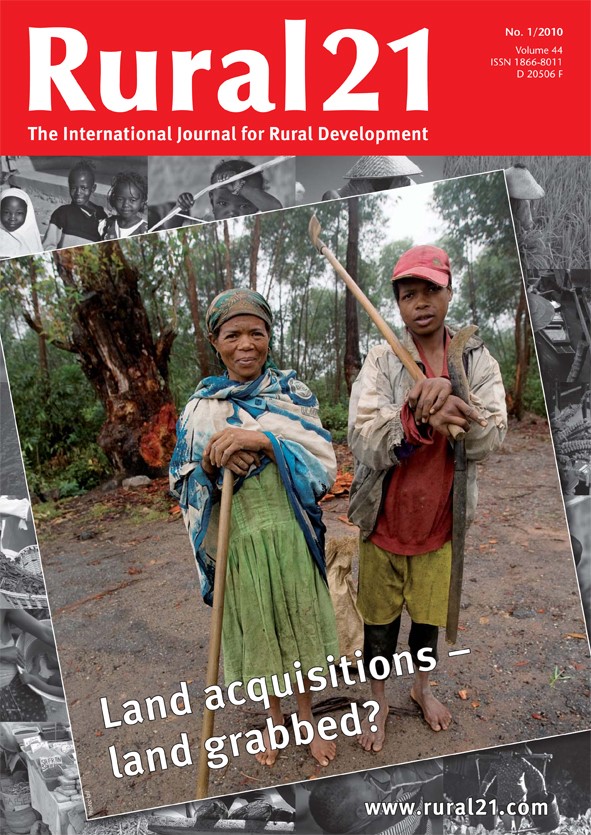Location
The international journal Rural 21 has dedicated more than 40 years to all topics surrounding rural development. Its ambition is to further those strategies and policies that strengthen rural areas of developing and newly industrialising countries and encourage their implementation. The journal addresses the complete range of relevant themes – from agriculture and fisheries via capacity building and education through to health and social security, energy supply and trade. Center-stage is always devoted to inquiring into how measures and strategies can contribute to global food security and to reducing poverty.
Rural 21 desires to further the dialogue between science and politics, the private sector, civil society and practitioners. Two platforms are designed for this purpose: Rural 21 in print is published four times a year, each issue highlighting a specific focus of rural development – this print edition is read in more than 150 countries. In parallel, Rural 21 online keeps the rural development community up to date on news and events, scientific findings and other print and online publications.
Rural 21 is published by DLG-Verlag GmbH in Frankfurt/Germany. Financial partners are BMZ (German Federal Ministry for Economic Cooperation and Development), GIZ (Deutsche Gesellschaft für Internationale Zusammenarbeit), DLG (German Agricultural Society – Deutsche Landwirtschaft-Gesellschaft), SDC (Swiss Agency for Development and Cooperation) and Helvetas Swiss Intercooperation.
The first issue of Rural 21 dates back to 1968. From 1974 to 2007, the journal was published in three languages entitled "entwicklung & ländlicher raum" / "agriculture & rural development" / "agriculture & développement rural". In 2008, the journal was relaunched as "Rural 21".
Members:
Resources
Displaying 236 - 240 of 319African farmers develop their own rice cultivars
Nerica – New Rice for Africa is the name of the great biotechnological success in rice breeding. What scientists created in the lab using modern methods, namely hybrids of African rice and Asian rice, had already come into being decades ago by chance in West African ?elds.
Big push for development or erosion of local livelihood?
The recent upsurge in Foreign Direct Investment (FDI) in land raises the hope to bridge the gap of decades of underinvestment in developing countries’ agricultural sector, but it may also threaten host countries’ food security and increase the vulnerability of the rural population. Based on four country case studies conducted by Deutsche Gesellschaft für Technische Zusammenarbeit (GTZ), this article illustrates distinct impacts of large-scale investments in agricultural land.
Regional rural development needs people empowerment
Lessons learnt from India prove that people empowerment through self-help groups and target group orientation still matters for sustainable rural development. However, this is only true if economic, socio-cultural, political and environmental empowerment interlock. This article makes an argument for a grassroot-level and participative approach of people empowerment in regional rural development.
Water and adaptation to climate change
Developing countries, as a group, are the ones most threatened by the hydrological impacts of global climate change. Water is a critical resource in development, and it is affected by climate change in multiple, complex ways ? through changes in temperature and rising sea levels, changes in precipitation patterns, and melting snowfields and glaciers.
Water harvesting for home food security
Poverty in rural households have deepened in the past two years through world events: unprecedented rises in food and fuel prices were followed by global economic meltdown, all amidst growing climate uncertainty. Balancing water availability within and across growing seasons, water harvesting helps to buffer households against drought. Research on water harvesting in South Africa has focused on rural household livelihoods. Innovative results on appropriate water harvesting technologies and food security facilitation techniques are now being implemented in villages across South Africa.



